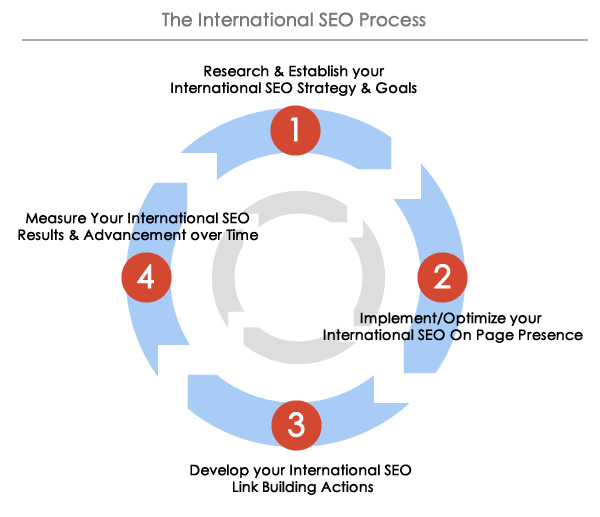Crafting a Global Footprint: International SEO Approaches for Sustainable Growth
Crafting a Global Footprint: International SEO Approaches for Sustainable Growth
Blog Article
Navigating the Digital Landscape: Leveraging International SEO for Cross-Border Success
In today's interconnected digital world, businesses are progressively looking past borders to take advantage of global markets. Leveraging seo (SEO) methods customized for international target markets is important for achieving cross-border success. The intricacy of browsing the digital landscape on a worldwide scale requires a nuanced method, from understanding the fundamentals of International search engine optimization to applying geotargeting and multilingual key words techniques. As firms make every effort to increase their reach and visibility throughout various regions, maximizing internet site frameworks and monitoring cross-border performance ended up being indispensable components of an effective worldwide search engine optimization technique.
Recognizing International SEO Basics
Navigating the details of worldwide Search engine optimization needs a solid grasp of essential concepts to effectively broaden online visibility throughout borders. One important facet of worldwide Search engine optimization is comprehending the value of localization.
Additionally, having a clear understanding of geo-targeting is essential. This involves showing to online search engine the specific countries or areas a website is targeting. Applying hreflang tags is one way to communicate this info, guaranteeing that the right variation of a webpage shows up in the search engine result for an individual in a particular location.
In addition, comprehending the influence of regional search engines and social networks platforms is vital for international search engine optimization success. While Google is dominant in numerous regions, countries like China have their own search engines like Baidu, needing tailored methods for each platform to optimize online presence (International SEO).

Targeting Multilingual Key Words Approaches
Developing multilingual key words strategies is necessary for effectively getting to diverse global target markets and making the most of on the internet exposure throughout different etymological regions. When targeting multilingual key words approaches, it is important to conduct detailed research to comprehend the details search terms and phrases utilized by the target audience in each linguistic area. This includes not just translating key words yet additionally considering social nuances, regional dialects, and search patterns distinct to every target market.
To create a successful multilingual keyword phrase approach, it is very important to prioritize relevance and search intent. Keywords should straighten with the web content on the site and resonate with the social context of the target audience. Utilizing devices such as Google Keyword Planner, SEMrush, or Ahrefs can help determine high-performing search phrases in various languages and evaluate their search quantity and competition degree.
Moreover, monitoring and assessing the efficiency of multilingual key words consistently is important for maximizing and improving the method gradually. By continually adapting to adjustments in search habits and fads, organizations can enhance their online visibility and bring in more global web traffic to their websites.
Executing Geotargeting and Hreflang Tags
When intending to improve global search engine optimization approaches, integrating geotargeting and hreflang tags is crucial for maximizing internet site visibility across different regions. Geotargeting entails customizing material to details areas, ensuring that users in various locations receive appropriate information. By applying geotargeting, services can improve their regional search rankings and draw in region-specific web traffic.

Optimizing Site Structure for International Visibility
To further boost international Search engine optimization techniques beyond geotargeting and hreflang tags, optimizing the web site framework is vital for achieving worldwide presence and making best use of reach across different areas. A well-structured web site not only enhances individual experience however additionally assists in search engine crawlers in comprehending the material and context of the website.
Additionally, creating language-specific subdirectories or subdomains can aid search engines provide the best variation of the internet site to individuals based on their language choices, further enhancing the general customer experience. Furthermore, maximizing URL frameworks to include pertinent keywords and geotargeted terms can improve the website's presence in various areas. By structuring the website successfully for international target markets, companies can raise their opportunities of bring in worldwide web traffic and expanding their reach across borders.

Tracking and Assessing Cross-Border Performance
Effective tracking and studying of cross-border performance is vital for reviewing the success of worldwide search engine optimization approaches and identifying chances for renovation in global reach and presence. By carefully tracking key efficiency indications (KPIs) throughout different markets, services can gain beneficial insights into the effectiveness of their cross-border search engine optimization initiatives. Keeping an eye on metrics such as organic web traffic, keyword positions, conversion rates, and bounce rates can offer a thorough sight of just how well a web site is doing in numerous regions.
By contrasting efficiency across various nations, regions, or languages, firms can pinpoint successful methods and localize web content to much better provide to specific target audiences (International SEO). Normal analysis of Search engine optimization performance on a worldwide range makes certain that companies can adjust their strategies rapidly to capitalize on arising opportunities and preserve a competitive side in international markets.
Conclusion
To conclude, worldwide SEO plays a crucial function in achieving cross-border success by maximizing internet sites for international presence, targeting multilingual key words strategies, carrying out geotargeting why not try these out and hreflang tags, and Homepage monitoring cross-border performance. By comprehending the principles of international search engine optimization and optimizing site frameworks as necessary, services can properly reach and involve with their target market throughout various areas and languages. This tactical method is essential for broadening market reach and driving online growth in today's digital landscape.
Report this page